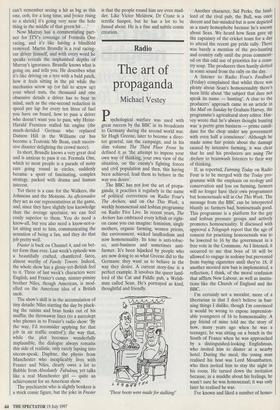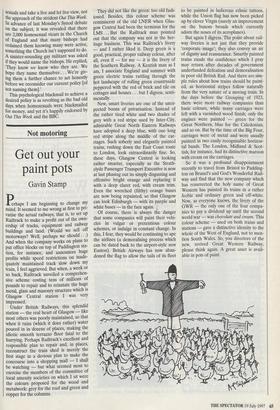Radio
The art of propaganda
Michael Vestey
Psychological warfare was used with great success by the BBC in its broadcasts to Germany during the second world war. Sir Hugh Greene, later to become a direc- tor general, ran the campaign, and in his slim volume The Third Floor Front he defined it as 'the attempt to impose your own way of thinking, your own view of the situation, on the enemy's fighting forces and civil population and then, this having been achieved, lead them to behave in the way you desire'.
The BBC has not lost the art of propa- ganda; it practises it regularly in the name of political correctness on Radio Four's The Archers, and on Out This Week, a weekly homosexual and lesbian programme on Radio Five Live. In recent years, The Archers has embraced every leftish or right- on cause you can imagine: feminism, single mothers, organic farming, women priests, the environment, wicked landlordism and now homosexuality. Its tone is anti-tobac- co, anti-business and sometimes anti- farmer. It's been hijacked by people who are now doing to us what Greene did to the Germans: they want us to behave in the way they desire. A current story-line is a perfect example. It involves the queer land- lord of the Cat and Fiddle pub, a Welsh- man called Sean. He's portrayed as kind, thoughtful and friendly.
These boots were made for stalking!' Another character, Sid Perks, the land- lord of the rival pub, the Bull, was once decent and fair-minded but is now depicted as a nasty homophobe because he's uneasy about Sean. We heard how Sean gave up the captaincy of the cricket team for a day to attend the recent gay pride rally. There was barely a mention of the pro-hunting and country rally until the press comment- ed on this odd use of priorities for a coun- try soap. The producers then hastily slotted in some sound from the rally on the day.
A listener to Radio Four's Feedback (Friday) complained that whilst there was plenty about Sean's homosexuality there's been little about 'the subject that dare not speak its name — hunting'. A clue to the producers' approach came in an article in the Mail on Sunday by Graham Harvey, the programme's agricultural story editor. Har- vey wrote that he's always thought hunting was 'a pretty grim business — prime candi- date for the chop under any government with even half a conscience'. Although he made some fair points about the damage caused by intensive farming, it was clear that he and his producers are using The Archers to brainwash listeners to their way of thinking.
If, as reported, Farming Today on Radio Four is to be merged with the Today pro- gramme with the emphasis on ecology and conservation and less on farming, farmers will no longer have their own programmes but homosexuals will in Out This Week. The message from the BBC can be interpreted bluntly as: farmers bad, homosexuals good. This programme is a platform for the gay and lesbian pressure groups and actively promotes homosexuality. It discussed with approval a Telegraph report that the age of consent for practising homosexuals was to be lowered to 16 by the government in a free vote in the Commons. As I listened, it occurred to me that boys of 16 will be allowed to engage in sodomy but prevented from buying cigarettes until they're 18, if another mooted new ban is implemented, a reflection, I think, of the moral confusion that afflicts New Labour, as well as institu- tions like the Church of England and the BBC.
' I'm certainly not a moralist, more of a libertarian in that I don't believe in ban- ning things I dislike, though I'm convinced it would be wrong to expose impression- able youngsters of 16 to homosexuality. A gay friend of mine told me the story of how, many years ago when he was a teenager, he was sitting on a bench in the South of France when he was approached by a distinguished-looking Englishman, who invited him to dinner at a nearby hotel. During the meal, the young man realised his host was Lord Mountbatten, who then invited him to stay the night in his room. He turned down the invitation because, in a muddle about his feelings, he wasn't sure he was homosexual; it was only later he realised he was.
I've known and liked a number of homo- sexuals and take a live and let live view, not the approach of the strident Out This Week. In advance of last Monday's Synod debate on the subject, it was revealed that there are 2,000 homosexual vicars in the Church of England and that many bishops had ordained them knowing many were active, something the Church isn't supposed to do. A sinister-sounding gay militant was asked If they would name the bishops. He replied, They know we know who they are. We hope they name themselves . .. We're giv- ing them a further chance to act honestly before we reconsider our current policy [of not naming them].' This psychological blackmail to achieve a desired policy is as revolting as the bad old days when homosexuals were blackmailed for money, and yet it's happily endorsed by Out This Week and the BBC.



























































 Previous page
Previous page